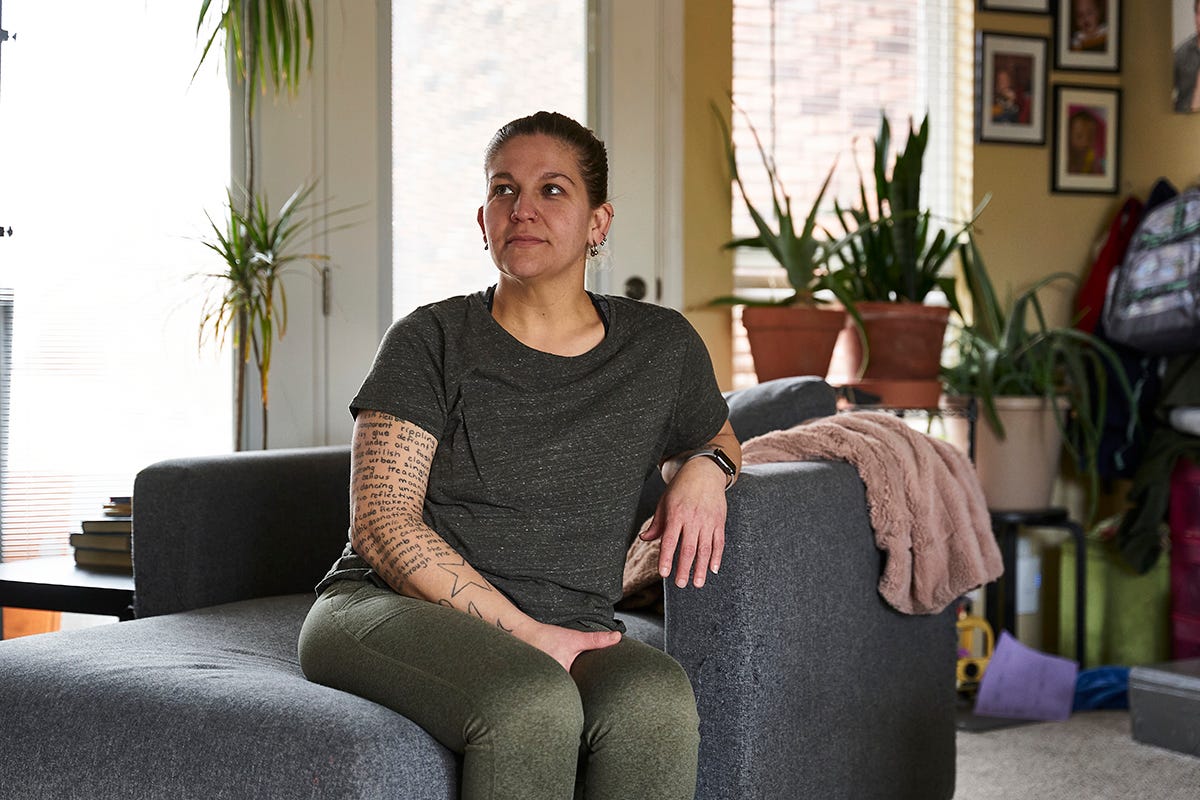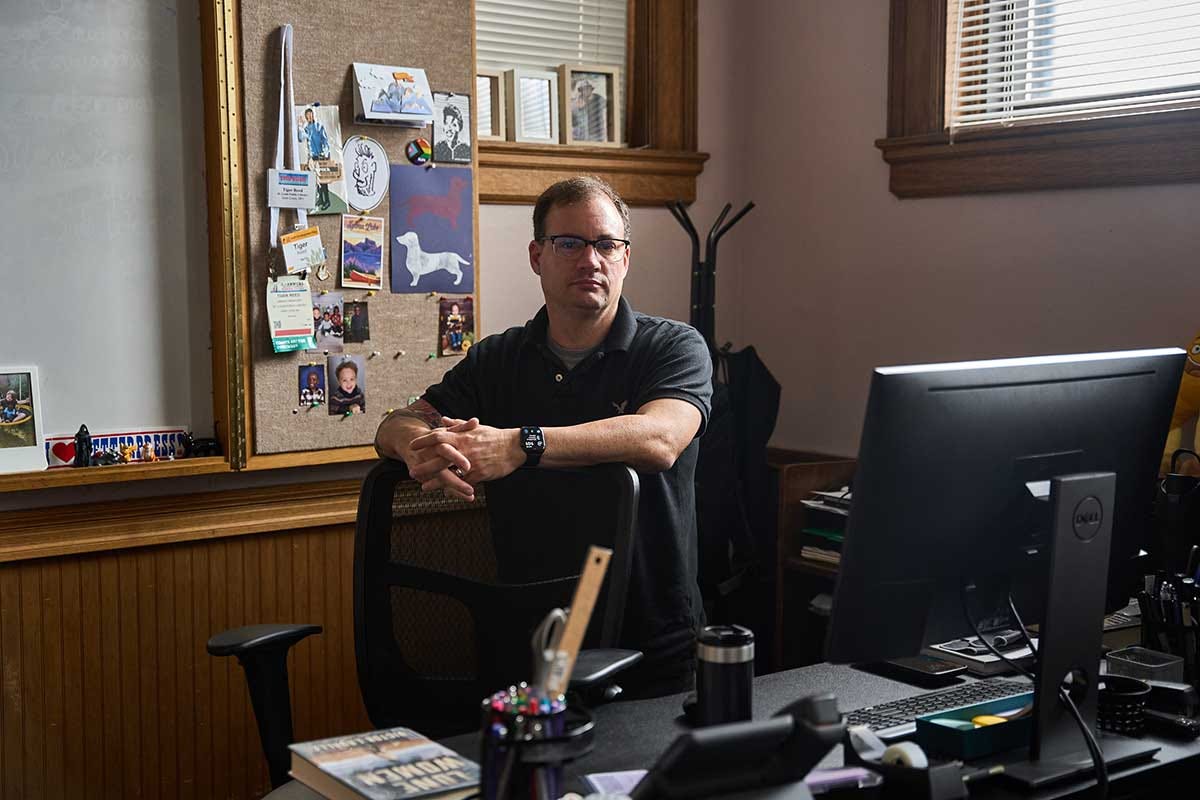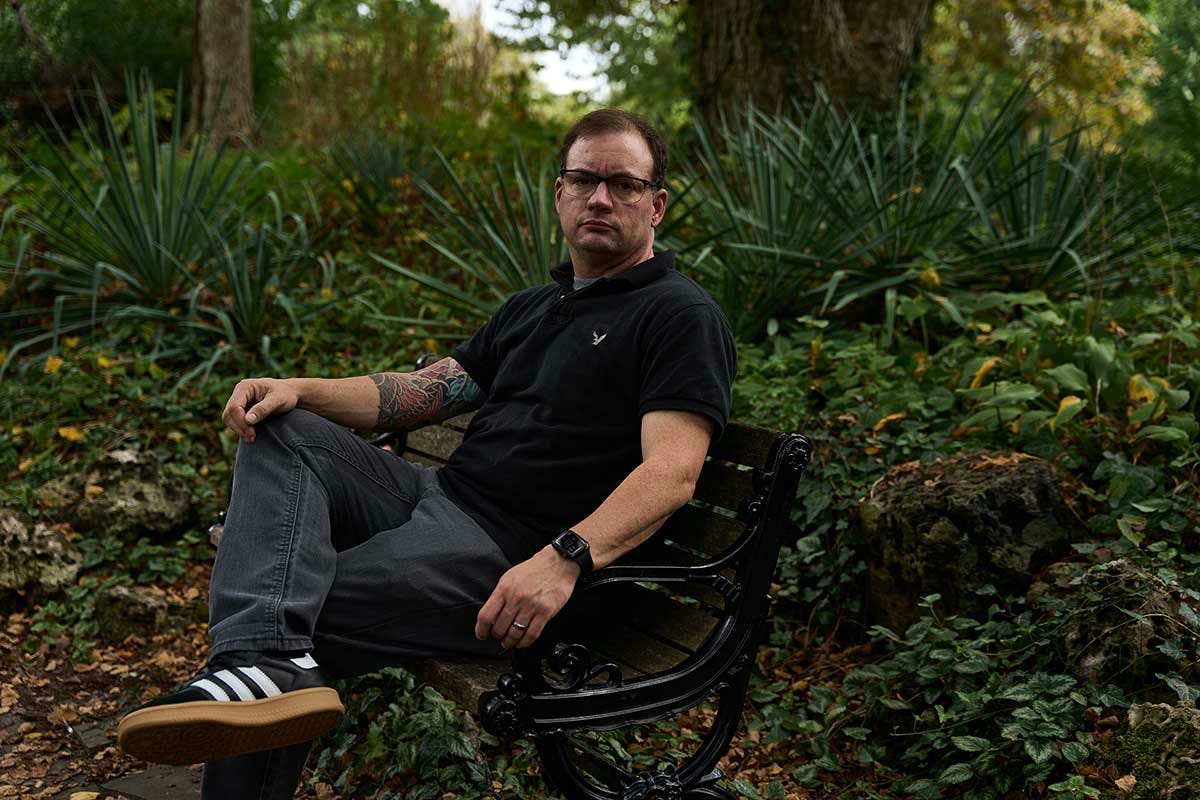My name is Tiger Reed. I am a 44-year-old librarian in St. Louis, Missouri. Since 2016, I have been married to Jamie Reed. She is the whistleblower who exposed the alarming effects of “gender-affirming” medical care given to minors at The Washington University Transgender Center at St. Louis Children’s Hospital in a 2023 article for The Free Press. Her story shocked the nation. I am also “Dad” to the five children we are raising together—two from Jamie’s previous marriage and three we have adopted.
And now, after 13 years of living as a man, I am in the process of tapering down my weekly testosterone injections to begin the process of becoming a woman again.
Jamie is the bravest person I know. I am not as brave. Though I didn’t try to stop Jamie, I had grave doubts about her blowing the whistle. I wondered why she couldn’t just quietly quit her job in protest and move on. I was scared for my safety, Jamie’s, and our children’s—I still am. All this created a huge rift in our marriage that we are still working to heal.
When Jamie exposed the harm gender-affirming care does to vulnerable children and teens, many with a history of trauma and various mental health diagnoses, she was widely attacked by activists. That Jamie was married to me, a trans man, was powerful evidence she was no transphobe.
But looking back, I realize the thing that threatened me the most about Jamie going public was something I didn’t want to face. This was the knowledge that my spouse and a growing chorus of knowledgeable critics were right. They were right that there was something fundamentally amiss with the message, especially to young people, that a swift gender transition was a safe, all-purpose solution to profound problems.
This realization meant I had to address my own doubts about my own transition.
I am now ready to publicly support Jamie. Not only that, I want to speak out about adult gender medicine, and how people have been misled—sometimes unintentionally—by gender clinicians about its safety and effectiveness.
I know there isn’t a lot of sympathy for those of us who transition as adults. People assume you made your choice, and you knew what you were signing up for. But in recent years we have been finding out that reliable research for transition, especially concerning its long-term effects, is virtually nonexistent. The comprehensive Cass Review showed the lack of scientific underpinning for the commonly accepted medical treatments for gender dysphoria—hormones and surgery—especially for kids.
And “gender-affirming care” fails to explore the often complex personal and psychological histories that lead people to believe transition is what they need.
I knew that going on testosterone at age 31, and five years later having my breasts removed, would bring profound physical changes. But no one I consulted prepared me for the emotional consequences of transition—for how the hormones would change not only my appearance but how I felt about myself and the world.

To understand how I decided to transition requires going back to my childhood. I was born in Miami in 1980 and named Roxxanne. I never met my father. He died from a heroin overdose when I was young. My mother was addicted to drugs, too, and the last time I saw her I was in my early twenties. She passed away in 2023. When I was two years old, I was sexually assaulted by a stranger, which resulted in my being put in foster care.
I moved in and out of foster care throughout my childhood, in between stints living with my maternal grandparents, who were divorced. My grandmother was extremely poor and troubled, and ultimately had a mental breakdown, which led me back to foster care. My grandfather, a severe alcoholic, was both verbally and physically abusive.
I knew from an early age that I was a lesbian, and I remember around the age of seven lying in bed wondering why I didn’t have a penis. Throughout my life, I’ve been bullied for my more masculine appearance. I was called names like boy, faggot, dyke, and he-she, among others. I’ve also been sexually abused multiple times by both strangers and family members. When I was 17, I was diagnosed with debilitating endometriosis, which caused me to have painful periods and sent me on a monthly hormonal roller coaster.
As I look back, I see how all this shaped my sense that becoming a woman would mean subjecting myself to a lifetime of assault and abuse, and experiencing relentless mental and physical pain.
I dropped out of high school in 1997 and had a series of minimum-wage jobs where I was often harassed. A turning point happened when I was 24 years old; I enrolled in community college and discovered a love of the arts, a passion I still pursue in my free time.
Around that time I watched a reality series called TransGeneration, which followed four transgender college students. The show was life-changing for me—I felt it presented a solution, a way out of the pain of being a woman.
The year 2011 was an agonizing one. I lost the one family member who had been a consistent support—my maternal step-grandmother. She and I talked on the phone every day for years. Her death crushed me.
I also wanted my painful periods to go away, and to no longer feel that my emotions were out of my control. I didn’t have health insurance so I turned to the internet to find a solution. I watched hundreds of hours of YouTube videos, and read countless blogs and websites that detailed people’s transitions. These stories are what helped convince me I wanted to transition, too.

At this time I was in graduate school studying studio art, and I started seeing a school therapist. She was extremely supportive of my decision to transition, and wrote me a letter of referral for testosterone. I also legally changed my name to Tiger—a pet name from a former girlfriend.
Before I transitioned I was someone who cried often—when I was sad, angry, or joyful, I couldn’t hold back my tears. But one of the earliest effects of testosterone was losing the ability to cry. The testosterone replaced my tears with a rage that would come out of nowhere. I’m embarrassed now to think how my spurts of anger have hurt those around me.
But there were parts of transitioning I welcomed. For example, having a beard. The whole process of growing one was exciting. It symbolized that I was really making a change and doing something new for myself.
In 2015, when I was 35 years old, I met Jamie, then a single mom of two rambunctious kids, at church. She’d just divorced her husband, and I had just gone through a bad breakup. At this point, Jamie and I were both believers that the transgender movement, which was growing in visibility and power, was a good thing, an answer to people’s distress. Within the year, we were engaged to be married.
To the outside world, Jamie and I looked like a heterosexual couple. But when out by myself, people usually assumed I was a gay man. I struggled to relate to other men, and I also lost my connection to the lesbian community, which I still miss dearly.
I also felt freakish—my chest was covered with hair, but I also bound my breasts each day so that no one would see features that made me look female. So, in 2016, when I was 36, I had a double mastectomy. But in the days following the surgery, I grieved over the loss of my breasts.
Today, the harmful physical effects of over a decade on testosterone have started to make themselves known: high cholesterol, high blood pressure, type 2 diabetes, high triglycerides, sleep apnea, and issues with my kidneys. While some of these problems are hereditary, the testosterone in my system only exacerbates them.
All those around me, from my close friends to my colleagues, supported my transition and referred to me with male pronouns. But I always felt a nagging sense that no matter what I did to make myself appear more male, I was an impostor.

It turns out transitioning couldn’t bring me the sense of comfort and inner peace I was seeking. In 2020, when I first put our adopted son, then six months old, in my arms, I instinctively knew how to rock him to sleep, to calm him by the way I held him. I became the parent who put him to bed most of the time. I know that fathers can comfort their infants, but when I did it, I felt like his mother.
Jamie has never pressured me about detransition. I’ve been thinking about it for several years now, but I only told Jamie about my decision in the past three months.
For detransitioners, there is no clear path. Gender-affirming clinicians have been ignoring and dismissing our concerns. While my transition was covered by insurance, my detransition is not. To restore my hairline and remove my body hair will cost me thousands. In the next few years I may have breast reconstructive surgery. There are many questions I don’t have the answers to—such as whether my kids, now ranging in age from two to 16 years old, should still call me “Dad.” I am planning to change my name back to Roxxanne, and to change my license so it says “female” again. But I wonder if I’ll ever pass as a woman.
The gender-affirming care model relies on vulnerable people’s impatience—rushing them toward major medical changes rather than stopping to understand the root of their pain and suffering. This affects not just patients, but entire families. And as Jamie has shown, confused and scared parents get told—falsely—that without transition their children are likely to commit suicide.
I’m going public because I want people like me who have complex and nuanced reasons for their gender distress to be part of the conversation. I want people to know there are more options than medicalizing their bodies for the rest of their lives.
Tiger Reed, a librarian, is married to whistleblower Jamie Reed, who is the executive director of The LGBT Courage Coalition.
And to support more of our work, become a Free Press subscriber today:

 By The Free Press | Created at 2024-09-30 01:04:54 | Updated at 2024-09-30 03:25:49
2 hours ago
By The Free Press | Created at 2024-09-30 01:04:54 | Updated at 2024-09-30 03:25:49
2 hours ago



